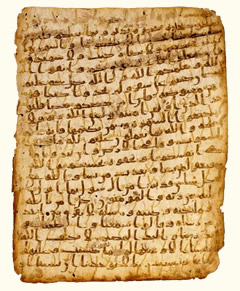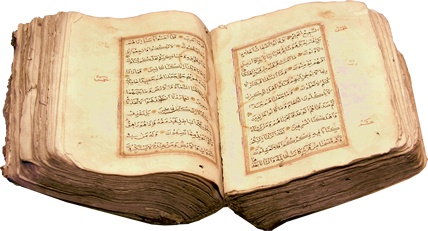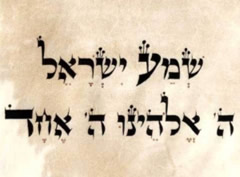
An early Quranic manuscript on vellum, written in sepia-coloured Hijazi script. (The David Collection, Copenhagen).

Quranic principles regarding the relationship with the People of the Book are built on respect, tolerance and common ground.

An early Quranic manuscript on vellum, written in sepia-coloured Hijazi script. (The David Collection, Copenhagen).
Diversity and pluralism is integral to the message of the Quran, and are signs of the wondrous variety of God’s creation: “People, We created you all from a single man and a single woman, and made you into races and tribes so that you should recognise one another. In God’s eyes, the most honoured of you are the ones most mindful of Him: God is all knowing, all aware.” (49:13). According to Quranic teaching, religious pluralism is vital for social order and progress, and provides the key to tolerance. The Quran celebrates the differences amongst humankind, and instructs not only one faith group, but all of humanity to do good deeds and live in peace with each other. Indeed, the Quran repeatedly addresses humanity as a whole when it directs people towards justice, moral and spiritual values, and addresses Muslims specifically when referring to acts of worship and Islamic law. The Quranic message of variety and coexistence is the cornerstone of the Islamic principle for a just and harmonious society. Thus religious pluralism, according to the Quranic teaching, is vital for social order and progress, and provides the key to tolerance: “There is no compulsion in religion (2:256); “You have your religion and I have mine.” (109:6). Back to Top

The Shema Yisrael is the first verse of a section in the Torah (Hebrew Bible), reading "Hear, O Israel: the Lord is our God, the Lord is one" found in Deuteronomy 6:4.
God encourages humankind to unite in finding the common ground, and the Quran affirms the special relationship between Muslims, Jews and Christians –a shared, sacred bond as recipients of the word of God.
Through the Quran, God affirms that the Jews, Muslims and Christians believe in the same revelations of guidance from the same Creator, encouraging the Abrahamic faiths to remember that which unites them in worship and belief: “Say, ‘We believe in what was revealed to us and in what was revealed to you; our God and your God are one [and the same]; we are devoted to Him” (Quran 29:46). God instructs followers of the Abrahamic faiths to “arrive at a statement that is common to us all: we worship God alone” (3:64).
Moses is a prophet highly revered by both Muslims and Jews: he is mentioned more times than any other prophet in the Quran. He conveyed the message of the Torah two thousand years before the Quranic revelation, as God tells Muhammad: “He has sent the Scriptures down to you [Prophet] with the Truth confirming what went before: He sent down the Torah and the Gospel earlier as a guide for people” (3: 3-4).
Back to Top
The Quran honours the Jews and Christians with a special acknowledgment as ‘ahl-ul kitaab’, or ‘People of the Book’. The Quran constantly reminds Muslims that among the People of the Book are those who believe and do righteous deeds.
“Among the People of the Book there is a staunch and just community who recite the revelations of God in the night season, falling prostrate (before Him). They believe in God and the Last Day; they enjoin what is right, and forbid what is wrong; and they hasten (in emulation) in (all) good works: They are in the ranks of the righteous. And whatever good they do, they will not be denied the reward. For God knows well those that do right.” (Quran 3:113-115)
A divine commandment instructs the Muslims against discourteous dispute with the People of the Book, instead guiding them towards a relationship based on harmony and respect, “Argue only in the best way with the People of the Book, except with those of them who acts unjustly” (29:46) and to debate only “in the most courteous way”(16:125). Back to Top
The Mughal Empire of Agra and Delhi saw Jews became court advisors, poets, and physicians. Emperor Akbar encouraged the building of synagogues and delighted in religious pluralism at court. Shivaji, a Hindu Rajput ruler in the seventeenth century recounts: “[Akbar] adopted the admirable policy of perfect harmony in relation to all the various sects such as Christians, Jews, Muslims... The aim of his liberal heart was to cherish and protect all the people.”